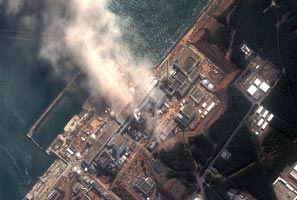The 64,000-Curie question, of course, is just how wide we're talking about . Because apparently, a lot of people are thinking: pretty damn wide. That's why San Franciscans, other Bay Area residents, and people all over the country have bought out every last tablet of potassium iodide there was to be had.
From the UK Guardian:
The three US government-approved suppliers of potassium iodide, a drug used as a protection against radiation sickness, have all sold out after a run on stocks from anxious west coasters fearful that the nuclear discharge from Japan was heading towards them. So intense was the rush that one of the suppliers, Anbex Inc, had been cleaned out of its 10,000 packets of 14 tablets within 24 hours of the Japanese earthquake.
The fact that only minuscule amounts of radiation have been detected on the American west coast, and that potassium iodide can have serious side-effects, has done nothing to dissuade the hoarders.
We here at KQED continue to field comments and questions about the radiation issue, enough so that I feel comfortable saying that if I've learned one thing from the nuclear portion of this horrific Japanese trifecta of disasters, it's this: People do not like radiation, real or imagined, in any dosage, small or large.
We did a post a couple of days ago that included interviews and quotes from several health and scientific professionals, all of whom debunked the notion that Californians would suffer any ill effects from trans-continental radiation particles.
With the Japan crisis worsening, KQED's Stephanie Martin yesterday revisited the topic with Dr. Charles Zender, an atmospheric physics researcher at UC Irvine who has specialized in tracking cross-Pacific pollution plumes.
Dr. Zender reiterated that the health risks from Japanese fallout are negligible, and likened the dispersal of radioactive particles traveling to the U.S. from Japan to either "pouring dye in a river." He said the nuclear emissions would have to increase on order of 1,000 or more would emissions levels begin to approach the background radiation levels we're exposed to every day.
Atmospheric physics researcher on the negligible risk from Japan nuclear accident
